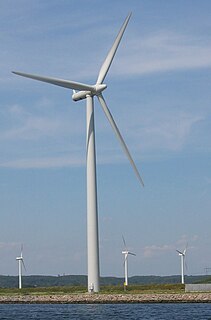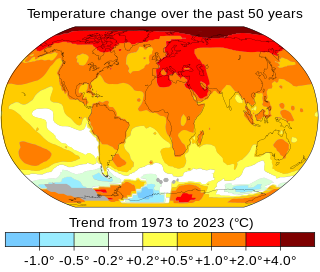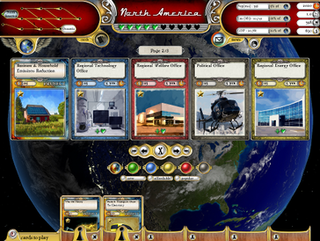
A carbon tax is a tax levied on the carbon emissions required to produce goods and services. Carbon taxes are intended to make visible the "hidden" social costs of carbon emissions, which are otherwise felt only in indirect ways like more severe weather events. In this way, they are designed to reduce carbon dioxide (CO
2) emissions by increasing prices. This both decreases demand for such goods and services and incentivizes efforts to make them less carbon-intensive. In its simplest form, a carbon tax covers only CO2 emissions; however, they can also cover other greenhouse gases, such as methane or nitrous oxide, by calculating their global warming potential relative to CO2.
Sustainable living describes a lifestyle that attempts to reduce an individual's or society's use of the Earth's natural resources, and one's personal resources. It is often called as "earth harmony living" or "net zero living". Its practitioners often attempt to reduce their ecological footprint by altering their methods of transportation, energy consumption, and/or diet. Its proponents aim to conduct their lives in ways that are consistent with sustainability, naturally balanced, and respectful of humanity's symbiotic relationship with the Earth's natural ecology. The practice and general philosophy of ecological living closely follows the overall principles of sustainable development.
Carbon neutrality refers to achieving net-zero carbon dioxide emissions. This can be done by balancing emissions of carbon dioxide with its removal or by eliminating emissions from society. It is used in the context of carbon dioxide-releasing processes associated with transportation, energy production, agriculture, and industry.

Mark Lynas is a British author and journalist whose work is focused on environmentalism and climate change. He is a contributor to New Statesman, The Ecologist, Granta and Geographical magazines, and The Guardian and The Observer newspapers in the UK; he also worked on the film The Age of Stupid. He was born in Fiji, grew up in Peru and the United Kingdom and holds a degree in history and politics from the University of Edinburgh. He has published several books including Six Degrees: Our Future on a Hotter Planet (2007) and The God Species: Saving the Planet in the Age of Humans (2011). He has stated "I think there is a 50–50 chance we can avoid a devastating rise in global temperature." Lynas is a communications strategist and climate lead for the Alliance for Science at Cornell University as well as a fellow of the German skeptics organization, GWUP.

Climate change mitigation consists of actions to limit global warming and its related effects. This involves reductions in human emissions of greenhouse gases (GHGs) as well as activities that reduce their concentration in the atmosphere.

A carbon footprint is the total greenhouse gas (GHG) emissions caused by an individual, event, organization, service, place or product, expressed as carbon dioxide equivalent. Greenhouse gases, including the carbon-containing gases carbon dioxide and methane, can be emitted through the burning of fossil fuels, land clearance and the production and consumption of food, manufactured goods, materials, wood, roads, buildings, transportation and other services. The term was popularized by a $250 million advertising campaign by the oil and gas company BP in an attempt to move public attention away from restricting the activities of fossil fuel companies and onto individual responsibility for solving climate change.

A carbon offset is a reduction in emissions of carbon dioxide or other greenhouse gases made in order to compensate for emissions made elsewhere. Offsets are measured in tonnes of carbon dioxide-equivalent (CO2e). One tonne of carbon offset represents the reduction of one tonne of carbon dioxide or its equivalent in other greenhouse gases.

Food miles is the distance food is transported from the time of its making until it reaches the consumer. Food miles are one factor used when testing the environmental impact of food, such as the carbon footprint of the food.

Individual and political action on climate change can take many forms. Many actions aim to build social and political support to limit and reduce the concentration of greenhouse gases (GHGs) in the atmosphere, with the goal of mitigating climate change. Other actions seek to address the ethical and moral aspects of climate justice, especially with regard to the anticipated unequal impacts of climate change adaptation.

Climate change includes both global warming driven by human-induced emissions of greenhouse gases and the resulting large-scale shifts in weather patterns. Though there have been previous periods of climatic change, since the mid-20th century humans have had an unprecedented impact on Earth's climate system and caused change on a global scale.

Biomass is plant or animal material used as fuel to produce electricity or heat. Examples are wood, energy crops and waste from forests, yards, or farms. Since biomass technically can be used as a fuel directly, some people use the terms biomass and biofuel interchangeably. More often than not, the word biomass simply denotes the biological raw material the fuel is made of. The word biofuel is usually reserved for liquid or gaseous fuels, used for transportation. The U.S. Energy Information Administration (EIA) follows this naming practice.
Anti-environmentalism is a movement that favors loose environmental regulation in favor of economic benefits and opposes strict environmental regulation aimed at preserving nature and the planet. Anti-environmentalists seek to persuade the public that environmental policy impacts society negatively. The movement's goals include to counter the effects of environmental ideology and movements, to redirect and diminish public concern about the environment, to discredit left-leaning environmentalists, and to persuade politicians against increased environmental regulation.

A global warming game, also known as a climate game or a climate change game, is a type of serious game. As a serious game, it attempts to simulate and explore real life issues to educate players through an interactive experience. The issues particular to a global warming video game are usually energy efficiency and the implementation of green technology as ways to reduce greenhouse gas emissions and thus counteract global warming. Global warming games also include more traditional board games, video games, as well as other varieties.
Environmentalists for Nuclear Energy Australia, formerly called Conservatives for Climate and Environment, was a political party registered in Australia from 2007 to 2010. EFN-Australia referred to itself as a not-for-profit environmental association, registered as a political party. It was the Australian affiliate of Environmentalists for Nuclear, and the party campaigned unsuccessfully to gain nuclear power in Australia.

Sustainability is the capacity to endure in a relatively ongoing way across various domains of life. In the 21st century, it refers generally to the capacity for Earth's biosphere and human civilization to co-exist. It is also defined as the process of people maintaining change in a homeostasis-balanced environment, in which the exploitation of resources, the direction of investments, the orientation of technological development, and institutional change are all in harmony and enhance both current and future potential to meet human needs and aspirations. For many in the field, sustainability is defined through the following interconnected domains or pillars: environmental, economic and social. Sub-domains of sustainable development have been considered also: cultural, technological and political.
Post Carbon Institute (PCI) is a think tank which provides information and analysis on climate change, energy scarcity, and other issues related to sustainability and long term community resilience. Its Fellows specialize in various fields related to the organization's mission, such as fossil fuels, renewable energy, food, water, and population. Post Carbon is incorporated as a 501(c)3 non-profit organization and is based in Corvallis, Oregon, United States.

Whole Earth Discipline: An Ecopragmatist Manifesto is the sixth book by Stewart Brand, published by Viking Penguin in 2009. He sees Earth and people propelled by three transformations: climate change, urbanization and biotechnology. Brand tackles "touchy issues" like nuclear power, genetic engineering and geoengineering, "fully aware that many of the environmentalist readers he hopes to reach will start out disagreeing with him".

The full relationship between fisheries and climate change is difficult to explore due to the context of each fishery and the many pathways that climate change affects. However, there is strong global evidence for these effects. Rising ocean temperatures and ocean acidification are radically altering marine aquatic ecosystems, while freshwater ecosystems are being impacted by changes in water temperature, water flow, and fish habitat loss. Climate change is modifying fish distribution and the productivity of marine and freshwater species.

Individual action on climate change can include personal choices in many areas, such as diet, means of long- and short-distance travel, household energy use, consumption of goods and services, and family size. Individuals can also engage in local and political advocacy around issues of climate change.
The Breakthrough Institute is an environmental research center located in Oakland, California. Founded in 2003 by Michael Shellenberger and Ted Nordhaus, Breakthrough Institute has policy programs in energy and climate, economic growth and innovation, conservation and development. It publishes a policy journal, organizes an annual conference, and offers a fellowship program for recent college graduates and graduate students. Breakthrough Institute's analyses of energy, climate, and innovation policy have been cited by The New York Times, NPR, The Wall Street Journal, and C-SPAN.














